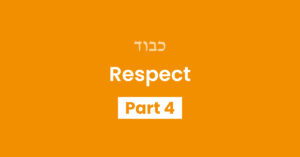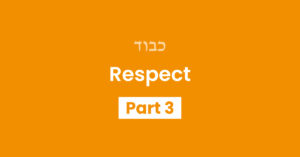During these weeks of Sefiras HaOmer, we have been focusing on treating others with respect. Last week, we explained that treating someone with “kavod” means showing that you recognize they matter. Every single Jew matters tremendously to Hashem – and to the entire world – because every Jew has the power to affect the spiritual and physical state of the world through his mitzvos and aveiros. When we keep this in mind, we can see how everyone is significant, and treat every person with the respect they deserve.
This week, let’s try to understand another concept about treating others with respect.
Treated Like a King
What is the classic case of someone who is treated with respect and honor? The most common image that may come to mind is a king. We stand up when a king enters the room, and we spread out a royal carpet for him to walk on. Why? Because of Kavod Malchus – a king deserves to be treated with honor.
Chazal teach us an interesting concept: At the end of a person’s life, the Heavenly Courts ask a number of questions. One question is: “Himlachta Es Chaveircha Alecha? Did you crown your friend like a king above you?”1
Did you crown your friend like a king above you?
What does this mean?
Rav Chaim Dov Stark2 explains: What makes a king special is that we all realize: This person is greater than me. A king is greater, more powerful, and has more authority than I have. That’s why every king wears a crown. It symbolizes that he has something that I don’t. The king has a greatness that I don’t have myself.
This is what Chazal mean when they say: “Did you crown your friend like a king above you?” Chazal mean to say: “Did you recognize the greatness in your friend? Were you able to see the ways in which he is greater than you?”
Did you recognize the greatness in your friend?
Maybe your friend is smarter than you are. Maybe he is more easygoing. Maybe she always knows how to make people feel comfortable. Maybe he is more selfless.
Every person has a unique set of strengths and abilities that make them stand out. Society tends to value certain types of qualities like intelligence and charisma, but there are so many other ways to shine. Maybe your neighbor is an excellent baker and hostess, or knows how to set the table exceptionally beautifully l’kavod Shabbos. Maybe the man behind the checkout counter always greets people with a big smile. Maybe your sister is very organized, or has a great singing voice. When I recognize the greatness in another person, it is a sign that I must treat them with honor.
Every person has a unique set of strengths and abilities that make them stand out.
The Gemara emphasizes this same point when it says: “If someone is greater than you in even one area, you are required to treat him with honor.”3 Even if he is worse than you in 100 areas, you must still treat him with respect, due to the greatness that you see in him.
Making Me More Honorable
Training our eyes to notice the greatness in other people is not just a way to give them honor, but it also makes us into greater people. On the most basic level – as the Ramban writes4 – seeing the good in others is a key aspect in developing humility.
But in addition to that, the more we honor other people, the more WE become honorable people.
The more we honor other people, the more WE become honorable people.
How does this work?
Pirkei Avos teaches5: “Eizehu Mechubad? HaMechabeid Es HaBriyos – Who is honorable? He who honors others.” You might think that if I point out the greatness in another person, it’s going to make me look bad, by comparison. After all, if I focus on how my friend is so much smarter, more organized, or more easygoing than I am, won’t that make me look worse?
But the truth is that the opposite is true. We all know people who are very full of themselves and constantly criticizing or pointing out the bad in others. They might come up with one-liners or snide comments to put other people down. Do we look up to these people and are we impressed by their actions? Usually not. People who make other people feel like a piece of dirt are usually not seen as very impressive people.
But on the other hand, people who compliment others and build them up are, themselves, seen as more mature and impressive. They have a certain sense of honor or “majesty” about them. They are more honorable individuals.6
The more we become people who are able to see and bring out the good in others, the more it will make us into honorable, respectable, majestic people. Building up other people by giving them compliments results in us becoming great.
This week, let’s practice seeing the greatness in other people – seeing how every person has unique qualities that make them special. When we realize every person’s greatness, we will be better able to treat them with honor and respect they deserve.
Sources: [1] See Raishis Chochma: Shaar HaYir’ah: Pirkei Chibut HaKever. Also Iggeres HaGra; [2] Kavod (Part 1): A Right to be Respected by Rabbi Chaim Dov Stark; [3] Pesachim 113b; [4] Iggeres HaRamban; [5] Pirkei Avos 4:1; [6] Kavod (Part 2): The Health of Recognition by Rabbi Chaim Dov Stark
Your Challenge
Once a day, compliment another person by pointing out a way in which they are great or special.
If you don’t get a chance to tell them directly, you can write it as a note to yourself on a piece of paper.
FOR EXAMPLE:
My brother is so easygoing.
My sister is so enthusiastic.
My neighbor is so organized.
Torah Questions
- Which person in Pirkei Avos (1:15) said: “Greet every person with a smiling face”?
- What passuk does the Gemara (Brachos 6b) use to support the idea that you should try to be the first to greet your friend before he greets you? (See Tehillim 34:15)
- What does the Gemara (Brachos 6b) call a person who is greeted by his friend and yet does not respond with a greeting of his own?
- From which heroic person in Tanach do Chazal learn the rule: “It is that better for a person to let himself be put into a fiery furnace than to embarrass his friend in public”? (See Rashi on Bereishis 38:25)
- The Gemara (Sanhedrin 76b) quotes a passuk which says: “And you will know that there is peace in your tent.” The Gemara says that this applies to someone who honors his __?__ more than himself.
- When a Jewish court sentences a person to death by hanging, the Torah requires that his body must be buried on the same day it was hanged; the dead body should not be left to hang overnight. Rashi explains that if the body would be left to hang overnight, it would be a disgrace to Hashem. How would it be a disgrace to Hashem? (See Rashi on Devarim 21:23)
Questions to Ponder
- The Gemara says that someone who is good to Hashem and good to people is called a “good tzaddik” whereas someone who is good to Hashem and bad to people is called a “tzaddik who is not good.” Why is such a person still called a tzaddik? Why isn’t he called a Rasha? Also, how is it possible for a person to be good to Hashem but bad to people? Doesn’t Hashem require us to be nice to people, not just nice to Hashem?
- Pirkei Avos teaches: “Who is honorable? Someone who honors Hashem’s creations, as it says, ‘For I (Hashem) honor those who honor Me, and those who disgrace Me will be disgraced’ (Shmuel I 2:30).” But how does this passuk from Shmuel support the idea in Pirkei Avos? The Mishna in Pirkei Avos was talking about someone who honors Hashem’s creations, whereas the passuk is talking about someone who honors Hashem.
- Pirkei Avos teaches: “Do not scorn any person, and do not disgrace any thing, for every person has ‘his hour’ and every thing has ‘its place.’” What do you think this means?
- Shammai gives 3 pieces of advice in Pirkei Avos: (1) Set aside times for learning Torah; (2) Speak little, but do a lot; and (3) Greet every person with a smiling face. Why do you think these 3 things were put together in the same Mishna? Is there any connection or common denominator between them?





